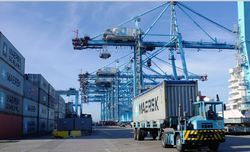World trade growth will support rate rises in hull and cargo, IUMI hears

World trade will continue to grow in 2019, which should support tentative rate rises in both hull and cargo sectors, the International Union of Marine Insurance conference has been told. Hardening of rates has also been helped by some 31 entities leaving marine classes in whole or substantial part since 2017.
‘A three-line Tweet now can change all of the business plans you have put in place for five or ten years,’ says Philip Graham of Chaucer.
World trade will continue to grow in 2019, which should support tentative rate rises in both hull and cargo sectors, the International Union of Marine Insurance conference has been told.
Philip Graham, head of marine at Chaucer, offered his analysis while introducing the facts and figures committee workshop on Monday morning.
Hardening has been assisted by some 31 entities leaving marine classes in whole or substantial part since 2017, and 21 departures since IUMI last met in Cape Town a year ago.
“Rates have gone up, not everywhere in the world, but they have. Particularly in cargo, particularly in hull,” he confirmed.
As a result, marine premiums worldwide rose by 1% last year.
Even so, the outlook for world trade remains volatile, he went on.
“A three-line Tweet now can change all of the business plans you have put in place for five or ten years,” he argued.
The strikes on Saudi oil infrastructure over the weekend will continue to make markets nervous, with political risk premiums clearly returning to the oil insurance market.
But despite speaking on a day on which oil prices saw their biggest ever intra-day jump, hitting $71/barrel, his expectation is for stability, on account of continued weakness on the demand side.
Meanwhile, government 10-year bond yields are at a three-decade low, which is bad news for insurance more broadly.
World trade grew by 3.2% last year, and is predicted to grow by 2.7% in 2019. Trade in the US grew 2.3%, and in the eurozone by 1.0%.
Meanwhile, the average age of the world fleet is 21.2 yrs, which means it is getting older.
It also grew by 2% last year, which represents a deceleration in the growth rate. The order book as of August 1 stood at 3,987 vessels by number and 78.8m aggregate gross tonnage.
Chinese yards remain dominant if that tally is judged on vessel numbers, South Korean shipbuilders if judged on aggregate gross tonnage and Europe leads based on value, thanks to its expertise in building cruise ships.
However, China is making big strides in cruise ship construction and may be eating into Europe’s market share before too long.